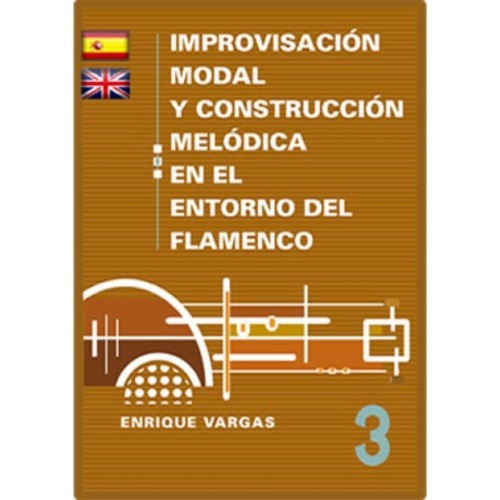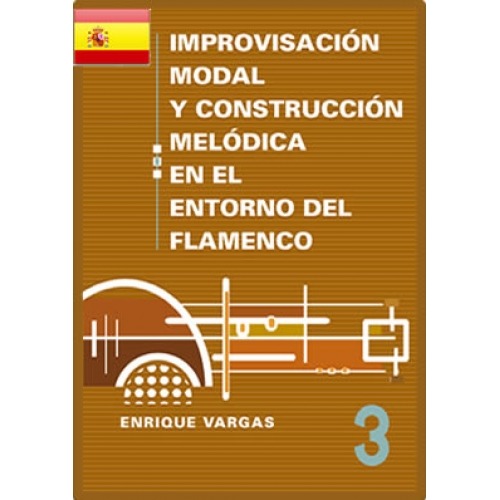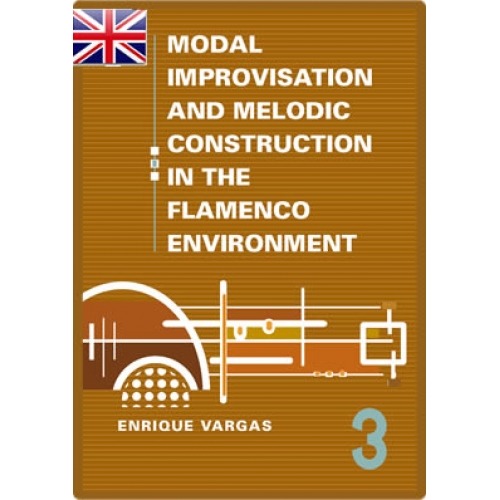IMPROVISACIÓN MODAL Y CONSTRUCCIÓN MELÓDICA FLAMENCO III
| Clase | Guitarra |
| Autor | Enrique Vargas |
Disponible
LIBRO:IMPROVISACIÓN MODAL Y CONSTRUCCIÓN MELÓDICA EN EL FLAMENCO III
Autor: Enrique Vargas
TOMO III
520 páginas; Escrito en notación musical para Guitarra
Disponible en 2 Idiomas: Castellano - Inglés
Desde hace muchos años el flamenco cautiva la imaginación de compositores y músicos occidentales a la vez que su complejo lenguaje modal y armónico genera serias confusiones. Hasta la fecha, los numerosos intentos llevados a cabo para ofrecer una explicación estructurada y coherente de este particular lenguaje musical, han sido poco convincentes e incompletos. Esto ha sido en gran parte debido al hecho de pretender analizar y comprender el flamenco desde el punto de vista de la teoría occidental, basada en las relaciones cadenciales de tensión-resolución, sin tomar en cuenta la naturaleza mestiza del mismo.
El flamenco, como género musical está basado en la combinación del sistema modal oriental, conocido como “Maqam” en los países de habla árabe -y con gran variedad de nombres equivalentes en el resto de países del Oriente- y la armonía occidental, influenciada por las modalidades orientales a lo largo de la historia y cuya fusión tuvo como epicentro una tierra crisol de culturas y civilizaciones: Andalucía. Sería por lo tanto imposible establecer un análisis exacto de la música del flamenco sin un conocimiento profundo tanto de las particularidades del Maqam, como de la armonía generada por sus complejas estructuras tetracordales.
Para ello, era necesario establecer una completa y bien estructurada de teoría modal del flamenco que, hasta la fecha no existía. Esta ha sido precisamente la principal razón que ha motivado la publicación de esta colección que intenta humildemente haber alcanzado dicho objetivo.
Los libros objeto de esta colección se presentan desde un punto de vista guitarrístico y cada escala, arpegio o patrón melódico viene acompañado de las digitaciones correspondientes. Sin embargo, el material musical ofrecido en los distintos volúmenes puede ser interpretado por cualquier otro instrumento, ya que la obra ha sido concebido como un manual teórico y práctico tanto para compositores, como para músicos instrumentistas de todos los géneros, arreglistas y musicólogos interesados en la música modal en general, y en el flamenco en particular.
Libro 3: "Aportaciones escalísticas modernas Penta-, Hexa-, Hpeta-, y Octatónicas en el lenguaje modal del flamenco"
En este libro se analizan las escalas modernas en el panorama modal del flamenco contemporáneo. Algunas de estas escalas, como la disminuida, la tonal, la superlocria, la acústica o la simétrica hexatonal, vienen del clásico moderno o jazz. Otras, como las escalas pentatónicas japonesas Hiro-joshi, Kokin-joshi y Kumoi-joshi, o la pentatónica hindú y la pentatónica diatónica anhemitónica, vienen de modalidades étnicas ajenas al flamenco. En este sentido, se analizan las implicaciones armónicas de estas escalas y se explica su implementación en el entorno del flamenco. Estas explicaciones vienen acompañadas de numerosos ejemplos musicales, tanto originales de Enrique Vargas como extraídos de diversas composiciones de artistas flamencos de la talla de Paco de Lucía o el Viejín.
Este volumen además trata el concepto de los sustitutos modales y en el se explica la politonalidad modal. Finalmente, se analiza todo el proceso que supone la réplica de escalas dominantes por terceras menores y tritonos, así como las distintas formas de resolver el intervalo de tritono.
Licks y AudioLicks:
Cada volumen incluye frases o ideas melódicas para la improvisación llamadas licks en inglés para que el lector pueda de forma práctica implementar los conceptos explicados a lo largo de los libros. Estos licks se pueden escuchar en la pestaña de AUDIOLICKS








